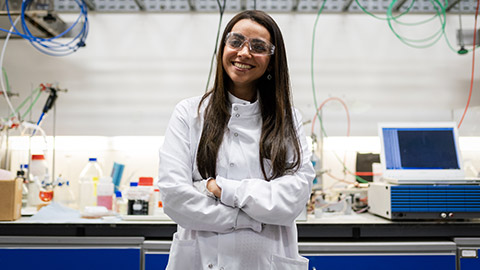Meet Gabriella...

Gabriella works for New Horizons Research Laboratory as a laboratory assistant. The laboratory is a medium-sized scientific enterprise developing innovative medical treatments for diseases such as cancer and auto-immune conditions. Among other duties, it is Gabriella's responsibility to care for the various animals that are used during the research experiments. Recently the laboratory amended its Environmental Sustainability Policy. Gabriella volunteered to be part of a committee tasked with implementing a variety of changes to workplace operations and educating other staff members on this important issue.
The following questions and answers address how Gabriella and the committee intend to implement the new Environmental Sustainability Policy.
What are the goals of your committee?
Our main goals include resource conservation, waste minimisation and reduction of our overall carbon footprint. This means we are working on several new initiatives regarding the use of printing, recycling, water and electricity use, carpooling and office plants. Luckily, our company already has a strong environmental sustainability reputation, participates in industry-wide initiatives and abides by various legislative and regulatory laws. So, our committee is mainly focused on including employees in the larger company-wide goals.
How did you determine which areas need the most attention?
We conducted an internal environmental sustainability audit, which revealed five key areas of concern. Firstly, we were using too much printing and photocopy paper and ink cartridges. Secondly, the taps in the toilets were not low-flow and the cisterns were not dual-flush. Thirdly, lights and air-conditioning were being left on in empty rooms. Fourthly, most employees were driving into work with only one person per car. Finally, the office decor featured artificial rather than live plants.
It was surprising how this audit made us aware of the basic issues that everyone was taking for granted! We were able to use these results to formulate our main goals. We presented our findings to management, who were very positive about implementing changes.
Do your initiatives comply with legislation and industry standards?
Yes, we have conducted quite a bit of research. After all, it's what we do best! We attended an environmental sustainability expo and conference, which was aimed at corporate workplaces. They had some great ideas, which we have 'borrowed'. Luckily the issue of environmental sustainability and climate change is very prominent at the moment. There is a lot of quality research being conducted and governments are implementing new laws and regulations all the time, so it hasn't been too hard to ensure we are on the right track.

How are you communicating your initiatives to the larger workforce?
Our company has an internal social media platform called Yammer, so we are using that to make regular updates, provide tips and share success stories. We are also holding a series of information sessions to kick off the new initiatives as they are implemented. Signage such as posters, procedures and reminders will also be displayed in various locations.
Do any of your initiatives impact your specific role in caring for animals?
Yes, some of the improvements have impacted my role. In particular, waste reduction and recycling. Animal care produces quite a bit of waste, including manure, food waste and used bedding. We have identified numerous areas where these waste items could be better managed. Previously, our company was complying with the law regarding disposal but not necessarily choosing environmentally sustainable options. There has long been a belief that these options are too expensive. However, we have suppliers and services that are affordable and, in some cases, even more cost-effective than before.
We are also exploring options for organic feed and bedding suppliers as a future initiative goal.

